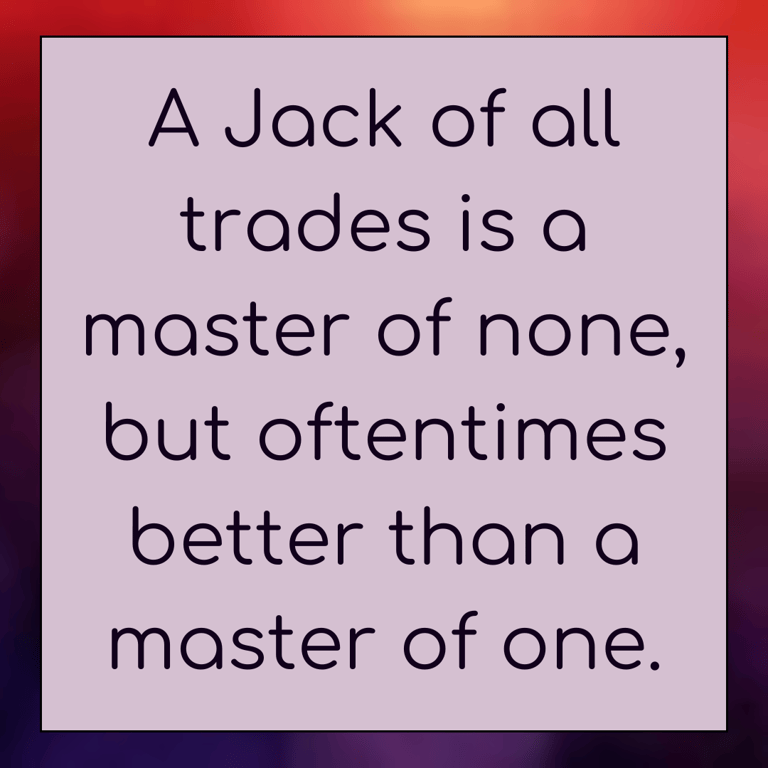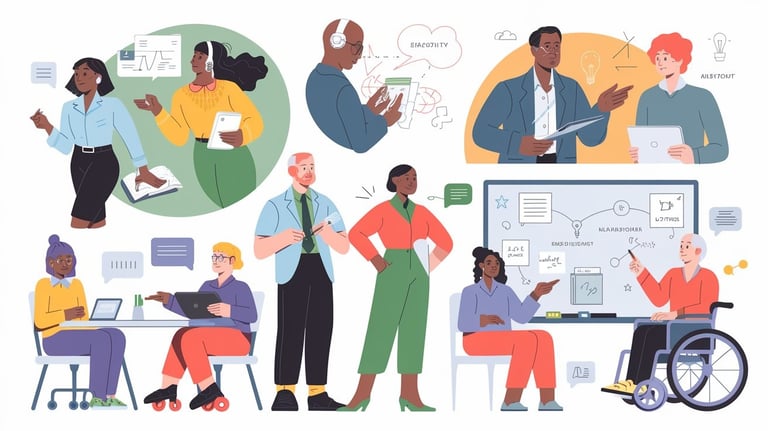The Truth About Jacks (and Jills)
4 min read
Being a generalist is often seen as a weakness, but the full saying – 'A Jack of all trades is a master of none, but oftentimes better than a master of one' – tells a different story. For many, especially those navigating systemic barriers, adaptability isn’t a luxury; it’s survival. Capitalism favours specialists to keep workers controlled, but generalists disrupt this by excelling across multiple disciplines, connecting ideas, and resisting rigid structures. From startup founders to educators, freelancers to neurodivergent thinkers, their versatility isn’t a flaw – it’s power. While specialists risk obsolescence, generalists evolve. And that’s precisely why the world knows and fears their strength.




A friend of mine recently lamented their ability to do too many things. Not in a bragging way, but in an exasperated, exhausted, I-feel-like-I’m-failing way. They described the constant ability to do diverse tasks and fulfil different duties as a curse rather than a skill, leading them to conclude that they were ‘a Jack of all trades, and master of none’.
Now, if you’ve ever had this phrase flung at you (or worse, applied it to yourself), it stings. It’s like an elegant way of saying mediocre at everything, great at nothing. And in a world obsessed with specialists, expertise, and LinkedIn buzzwords like thought leader (yes, even thinking is now a specialism) and industry titan (whatever that is, given the titans were overthrown), being a generalist can feel like being a side character in the great drama of success.
But here’s the plot twist.
That old saying?... It’s not the full phrase. The real expression is:
“A Jack of all trades is a master of none, but oftentimes better than a master of one.”
Let that sink in for a minute.
It’s not a condescending dismissal. It’s not an insult. It’s a compliment. A recognition that while specialists shine in narrow, specific domains, generalists often thrive in ways that specialists simply cannot.
For Some of Us, There Was No Other Choice
Now for a lot of people, being a generalist is not a choice – it’s a necessity. When you fall into certain demographics or must live certain lifestyles, you don’t get the luxury of being just one thing. You don’t get to be just “the writer” or “the consultant” or “the creative”. You’re also the strategist, the fixer, the problem solver. The person who has to navigate ‘isms’ and neurotypical nonsense. The one who must learn to read signs and manage symptoms, negotiate basic rights and navigate bureaucracy. If you want to survive, you have to be able to advocate for yourself – because no one else will. And since society simply refuses to accommodate you, you have to adapt. You build workarounds. You develop skills across multiple disciplines – not by choice but because you’ve been pushed in that direction.
The World Runs on Generalists
Capitalism tells us we must specialise – because it makes us easier to exploit. The less we know, the more dependent we are. The more replaceable we become. In a capitalist system a specialist is predictable. Train them for one task, keep them focused, keep them locked in, and they’ll stay in their neat, little, predictable boxes. But when you’re a generalist, when you can do multiple things – you become harder to box in. Harder to pin down. Harder to control. You see across disciplines, connect ideas that were never meant to touch, you move in ways the system can’t track. And so, they try to make us feel small for it. They demand that we shrink ourselves – because to be expansive is…revolutionary.
But despite capitalist interests, the world can’t function on one-track minds alone. The bridges between disciplines, industries, and skill sets should be built. The creative connections, the unconventional problem-solving, the ability to pivot when circumstances change need to happen. And these are a generalist’s domain. Whether it’s:
The startup founder who isn’t just a coder but also knows a thing or two about marketing, finance, and operations
The Black woman who isn’t just doing her job but also mentoring younger colleagues, managing micro-aggressions, and advocating for pay equity
The teacher who doesn’t just instruct but can also manage conflict, adapt lesson plans, and step in as a counsellor
The disabled person who has to be their own medical researcher, lawyer, and accessibility consultant while holding down a job
The freelancer who’s dabbled in design, writing, and project management, making them a Swiss Army knife in any creative team
The neurodivergent person whose unconventional way of thinking ends up revolutionising a workplace, even though they were nearly overlooked in the hiring process.
And how often are these all one and the same person?
Why? Because they have to be.
And the fact that they can be?
That’s not failure. That’s power.
The Trap of Specialisation
Now, I’m not saying specialists don’t have their place – they absolutely do. Surgeons, structural engineers, and deep-sea welders should probably stick to their lane (for all our sakes). But specialization comes with a risk: what happens when your niche becomes obsolete? When the industry shifts? When AI inevitably comes for your ultra-refined, super-specific skill set?
Specialisation is a capitalist trap – one that promises security but delivers obsolescence the moment the market decides you’re no longer useful. Train people to do one thing, tell them it’s their identity, their value, and then – when the job market changes – what happens?
For the generalist who never had the luxury of stability – who’s had to adapt their whole life, learn new skills on the fly, and pivot before pivoting became a corporate buzzword – it’s just another adaptation. Annoying? Sure. But we evolve. We figure it out – just like we always have, and just like we always will.
So, Here’s to the Generalists 🥂
To the people who wear multiple hats. To the multitaskers, the connectors, the (often more than) good-enough all-rounders. We’re not failing because we don’t have one singular expertise – we’re a threat because we have many. And the world knows it.


